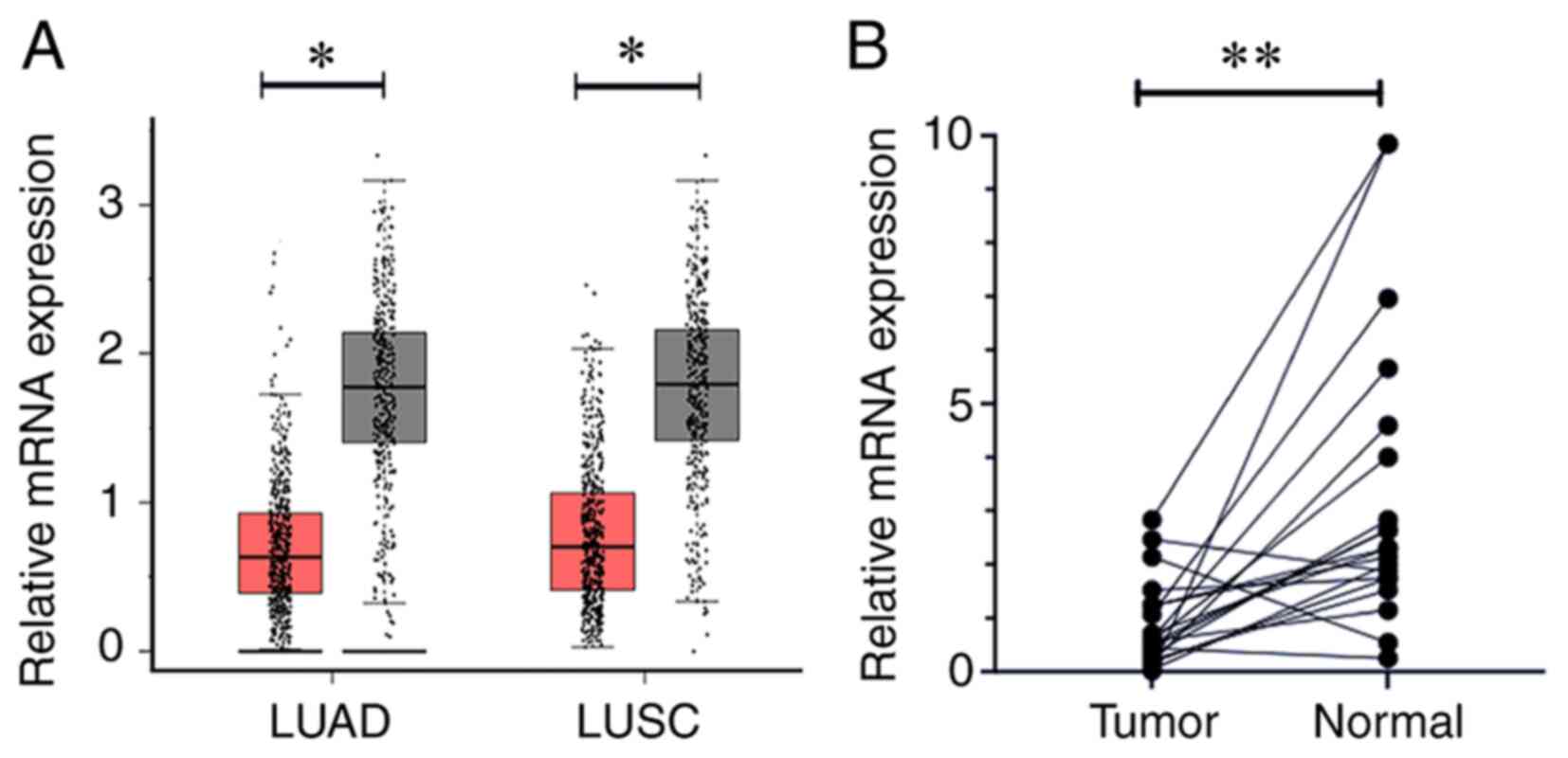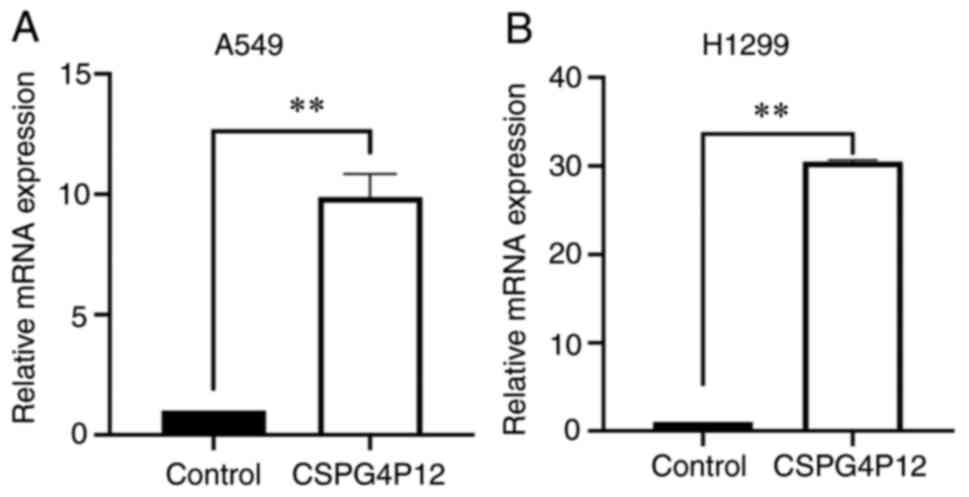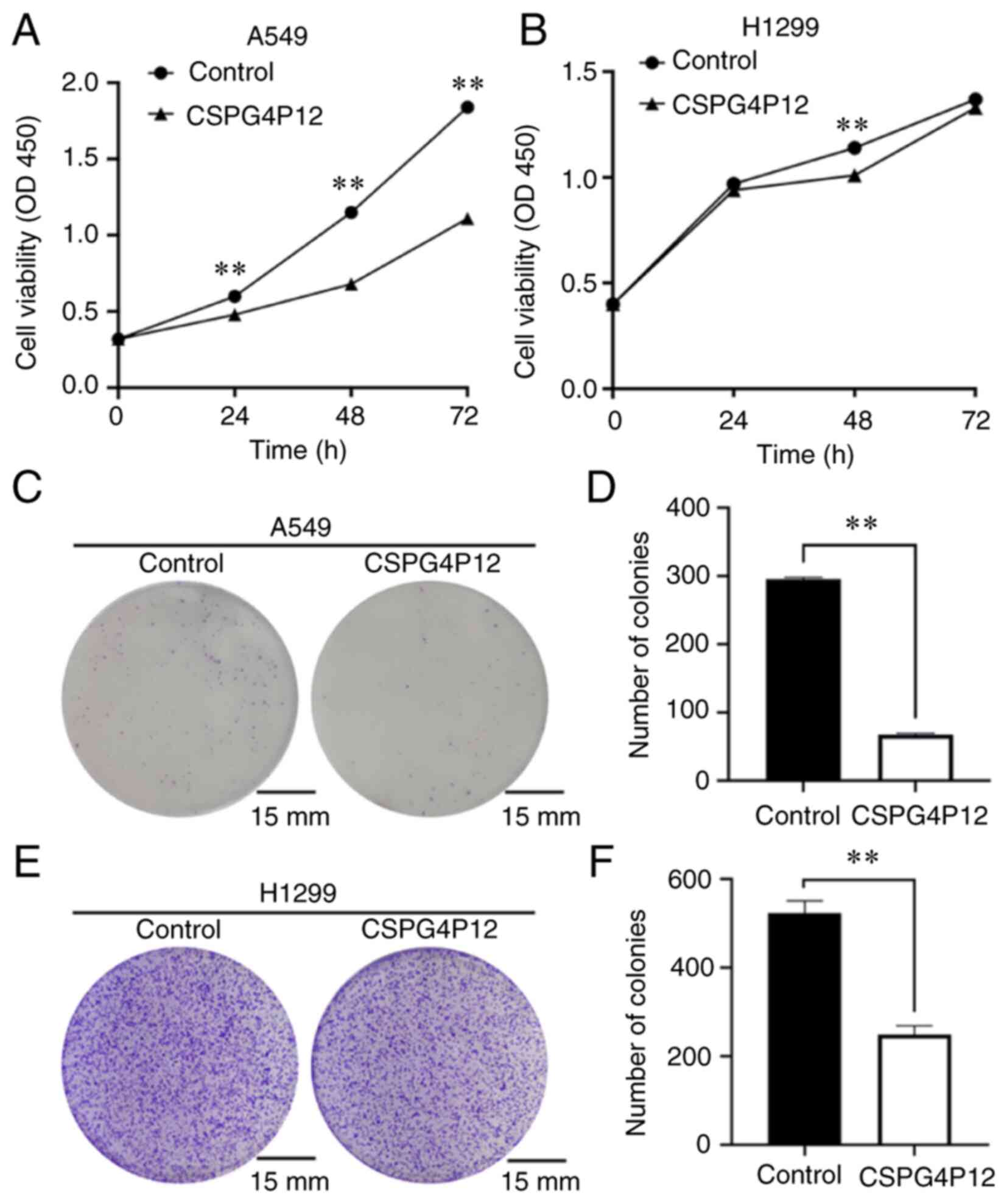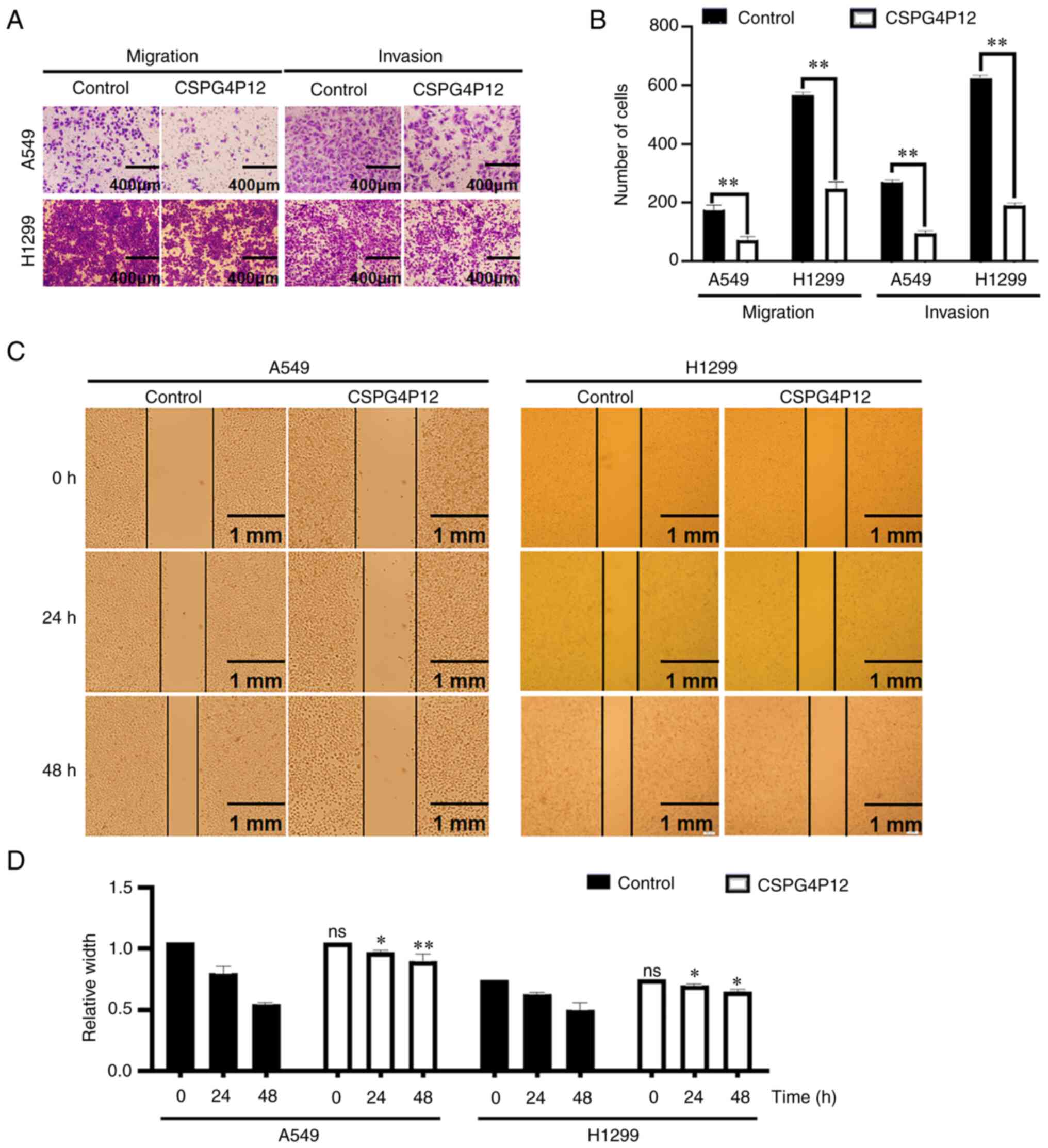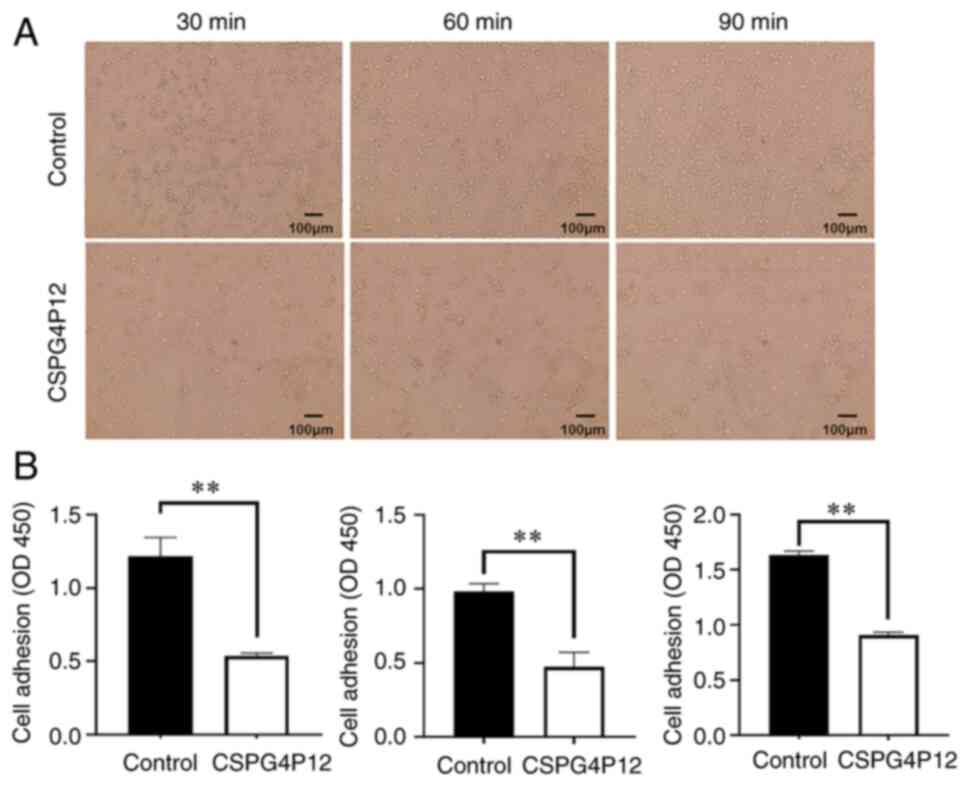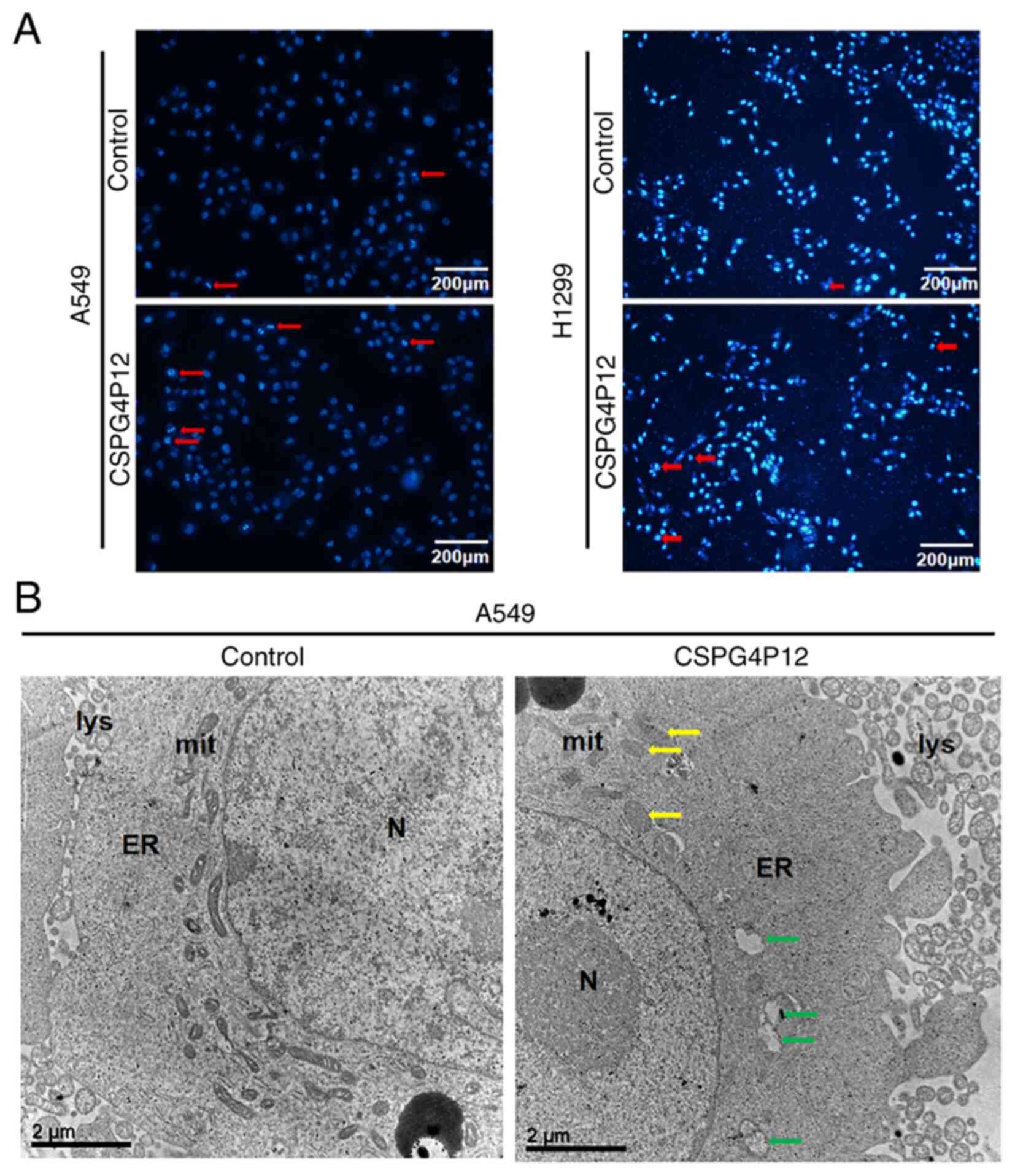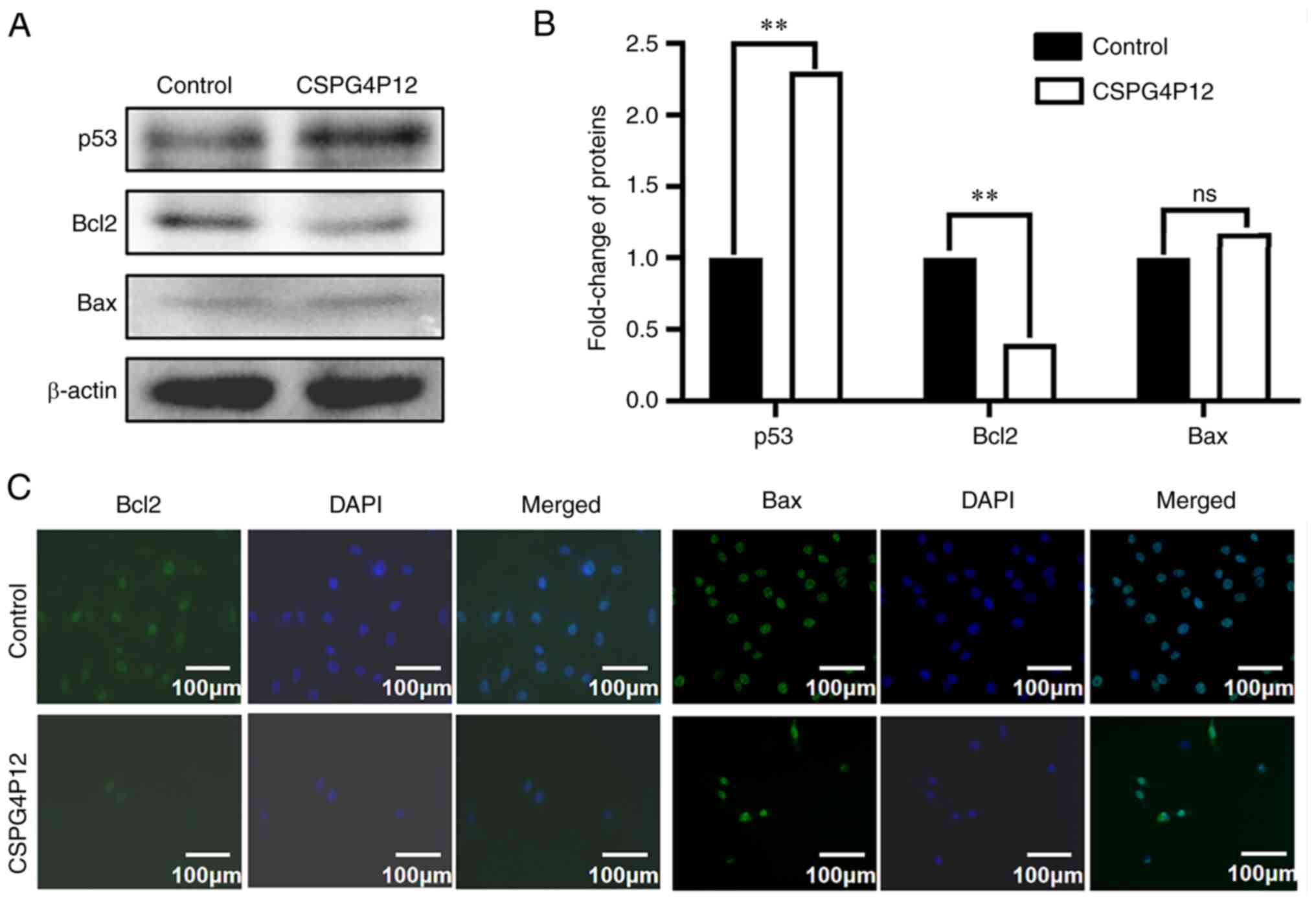|
1
|
Siegel RL, Miller KD, Fuchs HE and Jemal
A: Cancer Statistics, 2021. CA Cancer J Clin. 71:7–33.
2021.PubMed/NCBI View Article : Google Scholar
|
|
2
|
Sung H, Ferlay J, Siegel RL, Laversanne M,
Soerjomataram I, Jemal A and Bray F: Global cancer statistics 2020:
GLOBOCAN estimates of incidence and mortality worldwide for 36
cancers in 185 countries. CA Cancer J Clin. 71:209–249.
2021.PubMed/NCBI View Article : Google Scholar
|
|
3
|
Gadgeel SM, Severson RK, Kau Y, Graff J,
Weiss LK and Kalemkerian GP: Impact of race in lung cancer:
Analysis of temporal trends from a surveillance, epidemiology and
end results database. Chest. 120:55–63. 2001.PubMed/NCBI View Article : Google Scholar
|
|
4
|
Norouzi M and Hardy P: Clinical
applications of nanomedicines in lung cancer treatment. Acta
Biomater. 121:134–142. 2021.PubMed/NCBI View Article : Google Scholar
|
|
5
|
El-Hussein A, Manoto SL, Ombinda-Lemboumba
S, Alrowaili ZA and Mthunzi-Kufa P: A review of chemotherapy and
photodynamic therapy for lung cancer treatment. Anticancer Agents
Med Chem. 21:149–161. 2021.PubMed/NCBI View Article : Google Scholar
|
|
6
|
Ortega-Franco A, Calvo V, Franco F,
Provencio M and Califano R: Integrating immune checkpoint
inhibitors and targeted therapies in the treatment of early stage
non-small cell lung cancer: A narrative review. Transl Lung Cancer
Res. 9:2656–2673. 2020.PubMed/NCBI View Article : Google Scholar
|
|
7
|
Duma N, Santana-Davila R and Molina JR:
Non-small cell lung cancer: Epidemiology, screening, diagnosis and
treatment. Mayo Clin Proc. 94:1623–1640. 2019.PubMed/NCBI View Article : Google Scholar
|
|
8
|
Hu X, Yang L and Mo YY: Role of
Pseudogenes in tumorigenesis. Cancers (Basel). 10:45–61.
2018.PubMed/NCBI View Article : Google Scholar
|
|
9
|
Sisu C: Pseudogenes as biomarkers and
therapeutic targets in human cancers. Methods Mol Biol.
2324:319–337. 2021.PubMed/NCBI View Article : Google Scholar
|
|
10
|
Groen JN, Capraro D and Morris KV: The
emerging role of pseudogene expressed non-coding RNAs in cellular
functions. Int J Biochem Cell Biol. 54:350–355. 2014.PubMed/NCBI View Article : Google Scholar
|
|
11
|
Balakirev ES and Ayala FJ: Pseudogenes:
Are they ‘junk’ or functional DNA. Annu Rev Genet. 37:123–151.
2003.PubMed/NCBI View Article : Google Scholar
|
|
12
|
Wu C, Song W, Wang Z and Wang B: Functions
of lncRNA DUXAP8 in non-small cell lung cancer. Mol Biol Rep.
17:78–92. 2022.PubMed/NCBI View Article : Google Scholar
|
|
13
|
Wang XJ, Li XD, Lin FK, Sun HZ, Lin YY,
Wang ZL and Wang XP: The lnc-CTSLP8 upregulates CTSL1 as a
competitive endogenous RNA and promotes ovarian cancer metastasis.
J Exp Clin Cancer Res. 40:151–167. 2021.PubMed/NCBI View Article : Google Scholar
|
|
14
|
Hou Z, Wang Y, Xia N, Lv T, Yuan X and
Song Y: Pseudogene KRT17P3 drives cisplatin resistance of human
NSCLC cells by modulating miR-497-5p/mTOR. Cancer Sci. 112:275–286.
2021.PubMed/NCBI View Article : Google Scholar
|
|
15
|
Wiest T, Hyrenbach S, Bambul P, Erker B,
Pezzini A, Hausser I, Arnold M, Martin JJ, Engelter S, Lyrer P, et
al: Genetic analysis of familial connective tissue alterations
associated with cervical artery dissections suggests locus
heterogeneity. Stroke. 37:1697–1702. 2006.PubMed/NCBI View Article : Google Scholar
|
|
16
|
Wang X, Wang Y, Yu L, Sakakura K, Visus C,
Schwab JH, Ferrone CR, Favoino E, Koya Y, Campoli MR, et al: CSPG4
in cancer: Multiple roles. Curr Mol Med. 10:419–429.
2010.PubMed/NCBI View Article : Google Scholar
|
|
17
|
Egan CE, Stefanova D, Ahmed A, Raja VJ,
Thiemeyer JW, Chen KJ, Greenberg JA, Zhang TT, He B, Finnerty BM,
et al: CSPG4 is a potential therapeutic target in anaplastic
thyroid cancer. Thyroid. 31:1481–1493. 2021.PubMed/NCBI View Article : Google Scholar
|
|
18
|
Yang J, Liao Q, Price M, Moriarity B, Wolf
N, Felices M, Miller JS, Geller MA, Bendzick L, Hopps R, et al:
Chondroitin sulfate proteoglycan 4, a targetable oncoantigen that
promotes ovarian cancer growth, invasion, cisplatin resistance and
spheroid formation. Transl Oncol. 16(101318)2022.PubMed/NCBI View Article : Google Scholar
|
|
19
|
Poliseno L, Salmena L, Zhang J, Carver B,
Haveman WJ and Pandolfi PP: A coding-independent function of gene
and pseudogene mRNAs regulates tumour biology. Nature.
465:1033–1038. 2010.PubMed/NCBI View Article : Google Scholar
|
|
20
|
Liu J, Liu ZX, Wu QN, Lu YX, Wong CW, Miao
L, Wang Y, Wang ZX, Jin Y, He MM, et al: Long noncoding RNA AGPG
regulates PFKFB3-mediated tumor glycolytic reprogramming. Nat
Commun. 11:1507–1523. 2020.PubMed/NCBI View Article : Google Scholar
|
|
21
|
Tang ZF, Kang BX, Li CW, Chen TX and Zhang
ZM: GEPIA2: An enhanced web server for large-scale expression
profiling and interactive analysis. Nucleic Acids Res.
47:W556–W560. 2019.PubMed/NCBI View Article : Google Scholar
|
|
22
|
Livak KJ and Schmittgen TD: Analysis of
relative gene expression data using real-time quantitative PCR and
the 2(-Delta Delta C(T)) method. Methods. 25:402–408.
2001.PubMed/NCBI View Article : Google Scholar
|
|
23
|
Parkin DM: Global cancer statistics in the
year 2000. Lancet Oncol. 2:533–543. 2001.PubMed/NCBI View Article : Google Scholar
|
|
24
|
Lou W, Ding B and Fu P: Pseudogene-derived
lncRNAs and their miRNA sponging mechanism in human cancer. Front
Cell Dev Biol. 8:85–87. 2020.PubMed/NCBI View Article : Google Scholar
|
|
25
|
Yin D, Hua L, Wang J, Liu Y and Li X: Long
non-coding RNA DUXAP8 facilitates cell viability, migration and
glycolysis in non-small-cell lung cancer via regulating HK2 and
LDHA by inhibition of miR-409-3p. Onco Targets Ther. 13:7111–7123.
2020.PubMed/NCBI View Article : Google Scholar
|
|
26
|
Han YJ, Ma SF, Yourek G, Park YD and
Garcia JG: A transcribed pseudogene of MYLK promotes cell
proliferation. FASEB J. 25:2305–2312. 2011.PubMed/NCBI View Article : Google Scholar
|
|
27
|
Wang XH, Osada T, Wang YY, Yu L, Sakakura
K, Katayama A, McCarthy JB, Brufsky A, Chivukula M, Khoury T, et
al: CSPG4 protein as a new target for the antibody-based
immunotherapy of triple-negative breast cancer. J Natl Cancer Inst.
102:1496–1512. 2010.PubMed/NCBI View Article : Google Scholar
|
|
28
|
Mittelman A, Chen ZJ, Kageshita T, Yang H,
Yamada P, Baskind P, Goldbery N, Puccio C, Ahmed T, et al: Active
specific immunotherapy in patients with melanoma. A clinical trial
with mouse antiidiotypic monoclonal antibodies elicited with
syngeneic anti-high-molecular-weight-melanoma-associated antigen
monoclonal antibodies. J Clin Invest. 86:2136–2144. 1990.PubMed/NCBI View Article : Google Scholar
|
|
29
|
Mittelman A, Chen ZJ, Yang H, Wong GY and
Ferrone S: Human high molecular weight melanoma-associated antigen
(HMW-MAA) mimicry by mouse anti-idiotypic monoclonal antibody
MK2-23: Induction of humoral anti-HMW-MAA immunity and prolongation
of survival in patients with stage IV melanoma. Proc Natl Acad Sci
USA. 89:466–470. 1992.PubMed/NCBI View Article : Google Scholar
|
|
30
|
Jan R and Chaudhry GE: Understanding
apoptosis and apoptotic pathways targeted cancer therapeutics. Adv
Pharm Bull. 9:205–218. 2019.PubMed/NCBI View Article : Google Scholar
|
|
31
|
Precht TA, Phelps RA, Linseman DA, Butts
BD, Le SS, Laessig TA, Bouchard RJ and Heidenreich KA: The
permeability transition pore triggers Bax translocation to
mitochondria during neuronal apoptosis. Cell Death Differ.
12:255–265. 2005.PubMed/NCBI View Article : Google Scholar
|
|
32
|
Dashzeveg N and Yoshida K: Cell death
decision by p53 via control of the mitochondrial membrane. Cancer
Lett. 367:108–112. 2015.PubMed/NCBI View Article : Google Scholar
|
|
33
|
Bai HL, Kang CM, Sun ZQ, Li XH, Dai XY,
Huang RY, Zhao JJ, Bei YR, Huang XZ, Lu ZF, et al: TTDA inhibited
apoptosis by regulating the p53-Bax/Bcl2 axis in glioma. Exp
Neurol. 331:113380–113398. 2020.PubMed/NCBI View Article : Google Scholar
|
|
34
|
Campbell KJ and Tait SWG: Targeting BCL-2
regulated apoptosis in cancer. Open Biol. 8:203–219.
2018.PubMed/NCBI View Article : Google Scholar
|
|
35
|
Zhang J, Xie Y, Fan Q and Wang C: Effects
of karanjin on dimethylhydrazine induced colon carcinoma and
aberrant crypt foci are facilitated by alteration of the
p53/Bcl2/BAX pathway for apoptosis. Biotech Histochem. 96:202–212.
2021.PubMed/NCBI View Article : Google Scholar
|
|
36
|
Yu X, Dobrikov M, Keir ST, Gromeier M,
Pastan IH, Reisfeld R, Bigner DD and Chandramohan V: Synergistic
antitumor effects of 9.2.27-PE38KDEL and ABT-737 in primary and
metastatic brain tumors. PLoS One. 14:38–54. 2019.PubMed/NCBI View Article : Google Scholar
|















